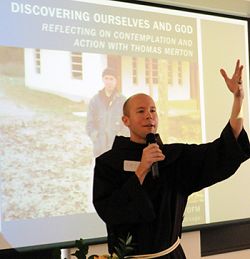Workshop on Thomas Merton asks 'Who does God say that you are?'
Friday, Feb. 03, 2017

IC photo/Marie Mischel
+ Enlarge
Franciscan Father Daniel Horan speaks about Thomas Merton at the Jan. 28 workshop in Salt Lake City.
SALT LAKE CITY — Given the opportunity to “step out of the humdrum of everyday life,” about 80 people gathered Jan. 28 at the Wasatch Retreat & Conference Center to listen to an expert on Thomas Merton.
Merton, a Trappist monk, wrote dozens of books on spirituality and social justice in the middle of the 20th century. Some of his best-known works are his auto-biography, “The Seven-Storey Mountain,” and “New Seeds of Contemplation.”
The workshop presenter, Franciscan Father Daniel Horan, is a professor of systematic theology at the Catholic Theological Union, and the author of several books, including one on Merton.
Fr. Horan asked those present to “step out the humdrum of everyday life,” and opened with a prayer by Thomas Merton that begins “My Lord God, I have no idea where I am going. …”
He then gave a brief biography of Merton, then entered a discussion of two questions that he said haunted the Trappist monk – “Who am I?” and “Who is God?”
These are “questions that we are not very keen to ask, at least, that’s my experience,” but Merton suggests that people look within and see where God is leading them, Horan said. He added that Merton was influenced by St. Francis of Assisi, who wrote, “What a person is before God, that he or she is, and no more.”
“Who we really are is who God sees when he looks at us,” Fr. Horan clarified, then added that the converse is also true, “That you are and no less.”
St. Francis was powerfully insightful to say that the world gives glory to God by being what they are, Fr. Horan said, but “we humans are trying to be something else rather than what we are.”
During the workshop, Fr. Horan mentioned several writers who influenced Merton, including the 19th-century Jesuit poet Gerard Manley Hopkins and the 14th-century philosopher/theologian Duns Scotus.
As he matured, Merton became aware that contemplation was a way to deepen his awareness of his interconnectedness with all creation, and the monk began to write about the social justice issues of his time: war and violence, racism, and poverty. He corresponded with Dorothy Day, Martin Luther King, Jr. and many other activists, and considered that correspondence part of his active ministry.
To follow Merton, Fr. Horan encouraged those at the workshop to continue to discern and discover their true selves and reunite with God so that he would lead them out into the world “to share the griefs and the sorrows as well as the joys and the happinesses of our sisters and brothers,” and that they root their actions always in the fact that “all women and men are united in God by the work of the Holy Spirit – what Merton called the hidden ground of love.”
For questions, comments or to report inaccuracies on the website, please CLICK HERE.
© Copyright 2024 The Diocese of Salt Lake City. All rights reserved.
© Copyright 2024 The Diocese of Salt Lake City. All rights reserved.

Stay Connected With Us